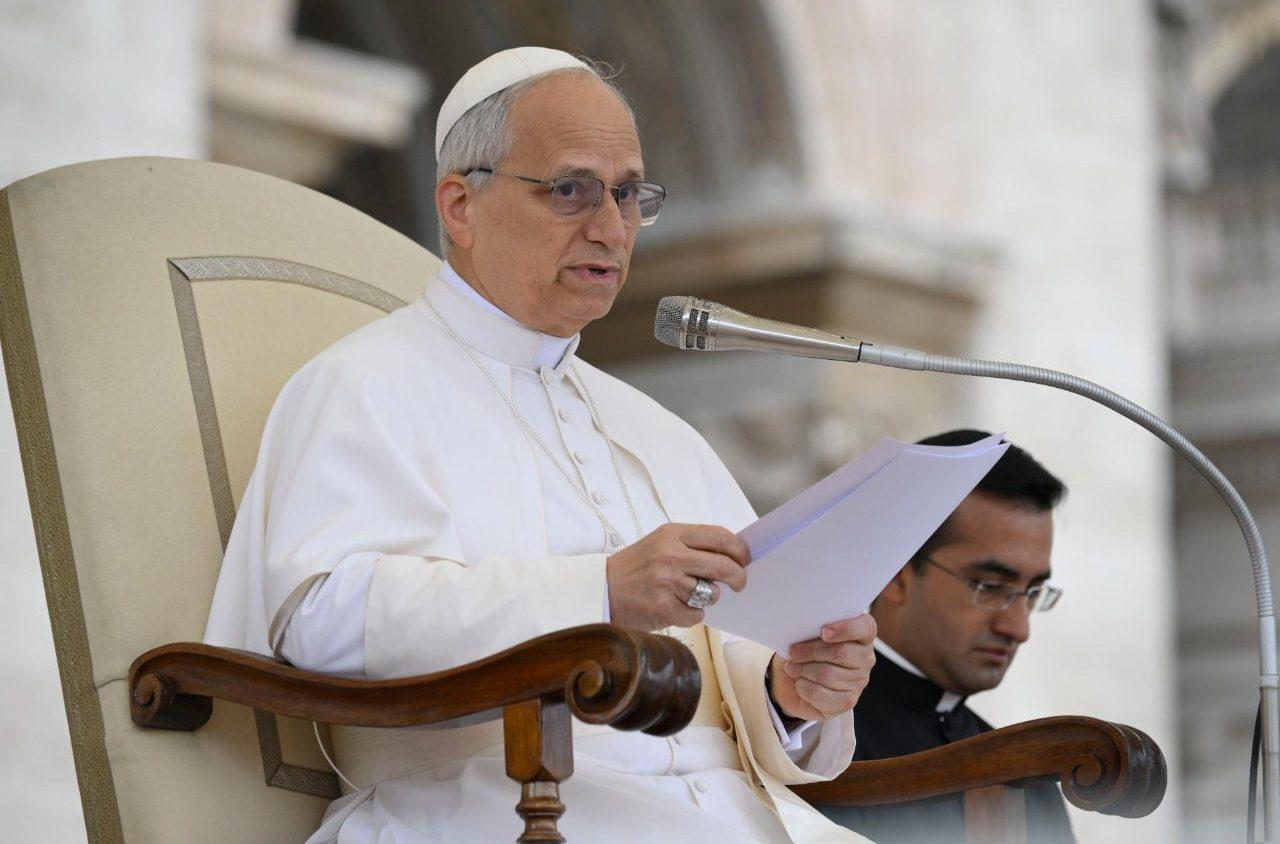ROME – In his first public general audience address, Pope Leo XIV said he would continue his predecessor’s reflection on Jesus Christ as a source of hope during the ongoing Jubilee year, and prayed for peace in Gaza.
During the May 21 audience, the pope received cheers when speaking in his native English and when greeting pilgrims and faithful from his home country of the United States of America.
After the Gospel was read aloud in various languages almost exclusively by women, apart from the reader for the Arabic language, Leo announced his decision to resume Pope Francis’s reflection on “Jesus Christ Our Hope” as his weekly catechesis topic during the 2025 Jubilee of Hope.
He pointed to a parable he said was an introduction to all parables, the parable of the sower, which he said offers a clear image of Jesus’s communication style and because this, ought to be a point of reference for communicating the Gospel in the modern world.
“Every parable tells a story that is taken from everyday life, yet wants to tell us something more, to refer us to a deeper meaning,” he said, and urged pilgrims to question themselves on how that parable applies to their personal lives and situations.
The parable of the sower speaks about the dynamic of God’s word and the effect it has, he said, saying, “Indeed, every word of the Gospel is like a seed that is thrown on the ground of our life.”
Jesus uses the image of the seed many times in scripture with different meanings, describing the wheat and the weeds, the mustard seed, the treasure hidden in the field, Leo said, asking, “What, then, is this soil?”
“It is our heart, but it is also the world, the community, the Church. The word of God, in fact, makes fruitful and provokes every reality,” he said.
When Jesus speaks offering the parable in this Gospel passage, people gather to hear, because his word “fascinates and intrigues” onlookers, despite a variety of different personal situations,” the pope said, saying, “The word of Jesus is for everyone, but it works in each person in a different way.”
“This context allows us to understand better the meaning of the parable,” he said, saying Jesus surprised listeners by saying the sower goes out and throws seeds everywhere, even on ground where it is unlikely they will bear fruit.
While this potentially seemed like a waste, it offers a deeper message, he said, saying, “We are used to calculating things – and at times it is necessary – but this does not apply in love!”
The potentially “wasteful” way the sower throws seeds on the ground “is an image of the way God loves us,” he said, but cautioned that “the destiny of the seed depends also on the way in which the earth welcomes it and the situation in which it finds itself.”
However, Pope Leo said one of the primary lessons from the parable is the fact that Jesus throws the seeds of his word on “all kinds of soil,” and in a variety of situations.
“At times we are more superficial and distracted, at times we let ourselves get carried away by enthusiasm, sometimes we are burdened by life’s worries, but there are also times when we are willing and welcoming,” he said, saying, “God is confident and hopes that sooner or later the seed will blossom.”
This, the pope said, is how God loves, “does not wait for us to become the best soil, but he always generously gives us his word. Perhaps by seeing that he trusts us, the desire to be better soil will be kindled in us. This is hope, founded on the rock of God’s generosity and mercy.”
Pope Leo said that in describing the way the seed bears fruit, Jesus also alludes to his own life and that he must die in order to give life, that he is willing to die in order to transform the lives of each and every person.
He referred to Vincent Van Gogh’s famed painting, The sower at sunset, which he said, “speaks to me of the farmer’s toil.”
Behind the image of the sower in the painting, the grain is already ripe, Leo said, calling it an “image of hope.”
“One way or another, the seed has borne fruit. We are not sure how, but it has,” he said, noting that the blazing sun stands at the center of the painting, “perhaps to remind us that it is God who moves history, even if he sometimes seems absent or distant.”
“It is the sun that warms the clods of earth and makes the seed ripen,” he said, urging faithful to pray for the grace to always welcome the seed of God’s word, and to not be discouraged when this is difficult, but rather to pray for God “to work on us more to make us become a better terrain.”
At the close of his audience, Pope Leo XIV again prayed for peace in Gaza, saying the situation is “increasingly painful and concerning.”
He did not mention Israeli hostages still in captivity, but appealed for the entry of humanitarian aid “and to put an end to hostilities, the heartbreaking price of which is paid by children, elderly and the sick.”
For the month of May he urged believers to pray the rosary for peace, and to ask for the Virgin Mary’s intercession so that humanity does not “close themselves to this gift of God and to disarm the heart.”
He also noted that Pope Francis passed away exactly one month ago, and recalled his predecessor “with so much gratitude.”
Follow Elise Ann Allen on X: @eliseannallen









